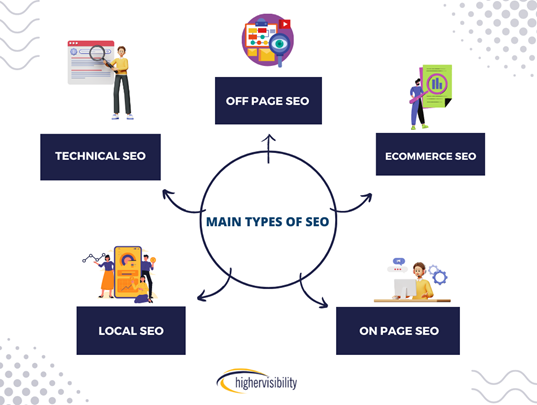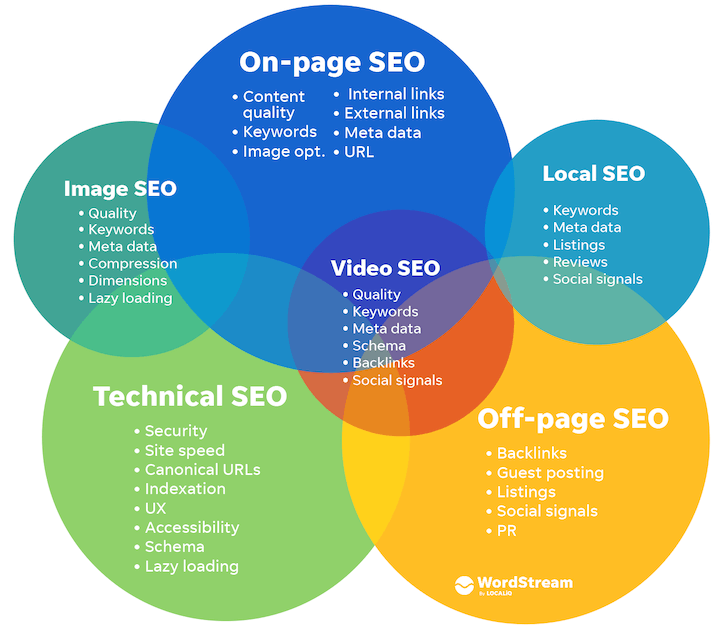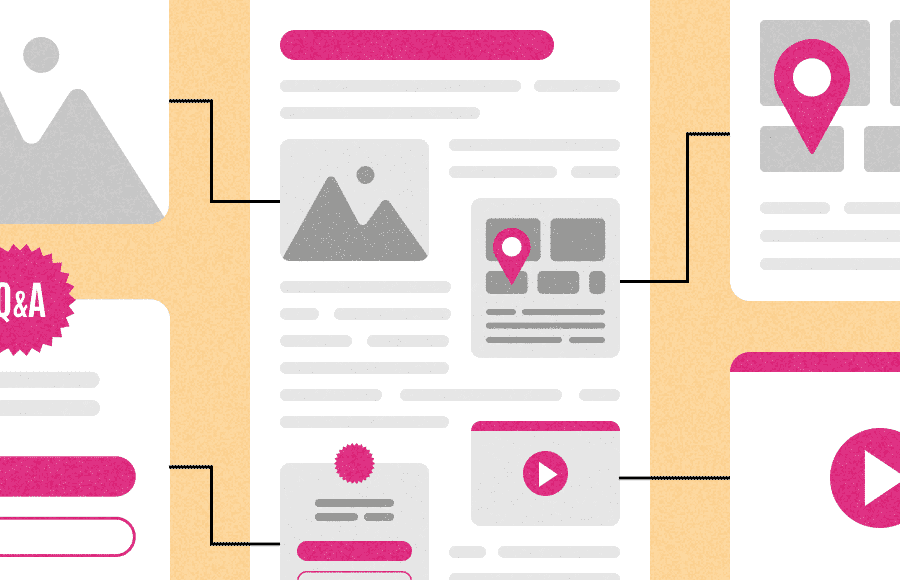Unlock the secrets of SEO with our comprehensive guide to understanding the different types and how they can improve your website.

Image courtesy of via DALL-E 3
Table of Contents
Introduction: What is SEO?
SEO, or Search Engine Optimization, is a crucial aspect of making sure that your website can be easily found on the internet. Just like how you use a search engine like Google to lookup information, SEO helps websites show up when people search for things online.
What Does SEO Stand For?
SEO stands for Search Engine Optimization. This means that website owners use specific techniques to help their sites rank higher on search engines like Google.
Why is SEO Important?
SEO is important because it helps websites get noticed by search engines. When a website is properly optimized for search engines, it is more likely to appear at the top of search results when people look for information related to that site.
On-Page SEO
On-page SEO is all about optimizing your website’s content so that search engines can easily find and rank it. By strategically placing keywords, creating engaging titles, and crafting informative meta descriptions, you can increase your website’s visibility and attract more visitors.
Using Keywords Smartly
Keywords are the words and phrases that people type into search engines when looking for information. It’s important to sprinkle these keywords throughout your website content so that search engines can understand what your site is about. However, it’s crucial to use them naturally and not overdo it, as keyword stuffing can actually hurt your SEO ranking.
Titles and Meta Descriptions
Your website’s titles and meta descriptions play a vital role in attracting visitors and improving SEO. Titles should be clear, descriptive, and include relevant keywords to entice users to click on your site. Meta descriptions are short summaries that appear below the title in search engine results, so make sure they accurately reflect the content on your page to increase click-through rates.
Off-Page SEO
Off-page SEO is all about the activities that happen outside of your website but can still impact how well it ranks on search engines. Let’s dive into some key aspects of off-page SEO that can help boost your website’s visibility.

Image courtesy of www.highervisibility.com via Google Images
Understanding Backlinks
Backlinks are links from other websites that point to your site. They act as a vote of confidence in the eyes of search engines. The more high-quality backlinks you have, the more authority your website gains, which can positively impact your search engine rankings.
Social Media’s Role
Social media is a powerful tool when it comes to off-page SEO. By being active on platforms like Facebook, Twitter, and Instagram, you can attract more visitors to your website. Additionally, social media shares and engagement can help increase your website’s visibility and improve its chances of ranking higher on search engine results pages.
Technical SEO
When we talk about Technical SEO, one crucial aspect to consider is the speed of your website. Website speed refers to how quickly your site loads for users. Search engines like Google prioritize websites that load quickly because they provide a better user experience. If your website takes too long to load, users might get frustrated and leave, leading to a higher bounce rate.
Mobile-Friendliness
Another important element of Technical SEO is having a mobile-friendly website. In today’s digital age, more and more people are using their smartphones or tablets to browse the internet. As a result, search engines take into account how well your website performs on mobile devices. A mobile-friendly website not only improves user experience but also boosts your SEO rankings.
Using Sitemaps
Sitemaps play a vital role in Technical SEO by helping search engines understand the structure of your website. A sitemap is like a map that shows search engines all the pages on your site, making it easier for them to crawl and index your content. By creating and submitting a sitemap to search engines, you can ensure that all your web pages are properly indexed, which can positively impact your SEO efforts.
Local SEO
In today’s digital age, businesses need to ensure that they can be easily found by potential customers in their local area. This is where Local SEO plays a crucial role. Let’s delve into what Local SEO is all about and how businesses can leverage it to boost their online presence.

Image courtesy of www.wordstream.com via Google Images
What is Local SEO?
Local SEO focuses on optimizing a website to rank better in local search results. This is essential for businesses that serve a specific geographic area and want to attract local customers. By implementing Local SEO strategies, businesses can increase their visibility when people search for products or services in their vicinity.
Google My Business
One of the key pillars of Local SEO is Google My Business. This is a free tool provided by Google that allows businesses to create a profile with essential information such as their address, phone number, business hours, and customer reviews. By claiming and optimizing their Google My Business listing, businesses can enhance their chances of appearing in local search results.
Local Listings
Local listings and directories play a significant role in Local SEO. These platforms, such as Yelp, Yellow Pages, and TripAdvisor, act as online repositories of business information. By ensuring that their business is listed accurately and consistently across these directories, companies can improve their local search visibility and credibility.
SEO Tools and Resources
When it comes to optimizing your website for search engines, having the right tools and resources at your disposal can make a significant difference in your success. Here, we’ll explore some of the essential tools and resources that can help you with your SEO efforts.
SEO Analysis Tools
SEO analysis tools are invaluable for understanding how well your website is performing in search engine results. Tools like Google Analytics, SEMrush, and Moz can provide you with insights into your website’s traffic, keyword performance, and overall SEO health. By using these tools, you can identify areas for improvement and make data-driven decisions to optimize your site for better search engine visibility.
Learning Resources
For those looking to deepen their understanding of SEO, there are plenty of resources available to help you learn the ins and outs of search engine optimization. Websites like Moz, Search Engine Land, and Backlinko offer comprehensive guides, articles, and tutorials to help you enhance your SEO knowledge. Additionally, online courses and webinars can provide structured learning opportunities for those looking to master the art of SEO.
Common SEO Mistakes to Avoid
Black hat SEO refers to unethical practices that some people use to try to manipulate search engine rankings. This includes things like keyword stuffing, hidden text, and buying links. While these tactics may provide a short-term boost in rankings, they can ultimately harm your website in the long run. Search engines like Google are constantly updating their algorithms to punish websites that engage in black hat SEO, so it’s best to stick to legitimate tactics.

Image courtesy of www.sprintzeal.com via Google Images
Avoiding Penalties
To avoid penalties from search engines, it’s crucial to follow their guidelines and best practices. This means steering clear of tactics like cloaking, duplicate content, and irrelevant keyword usage. Additionally, make sure your website is secure and free from malware, as these issues can also result in penalties. By staying up-to-date with SEO trends and focusing on providing valuable content to your audience, you can prevent the risk of penalties and maintain a positive reputation with search engines.
Measuring SEO Success
When it comes to SEO, it’s essential to track and measure the success of your strategies to see what’s working well and where you may need to make improvements. By understanding key metrics and using the right tools, you can effectively monitor your SEO performance.
Understanding Metrics
There are several key metrics used to measure SEO success:
1. Organic Traffic: This metric shows the number of visitors that come to your website through organic search results. An increase in organic traffic indicates that your SEO efforts are driving more people to your site.
2. Keyword Rankings: Monitoring where your website ranks for targeted keywords can help you assess the effectiveness of your keyword strategy. Moving up in search engine rankings for important keywords is a positive sign of SEO success.
3. Conversion Rate: Tracking the percentage of visitors who take a desired action on your website, such as making a purchase or filling out a contact form, can help you understand how well your site is converting visitors into customers.
4. Bounce Rate: The bounce rate measures the percentage of visitors who leave your site after viewing only one page. A high bounce rate could indicate that your website content isn’t meeting visitor expectations or that there are technical issues impacting user experience.
Tracking Progress
To effectively track your SEO performance, it’s important to use tools that can provide you with valuable insights into how your website is performing. Some popular tools for tracking SEO progress include Google Analytics, SEMrush, Moz, and Ahrefs.
These tools can help you monitor changes in organic traffic, track keyword rankings, analyze backlinks, and identify technical issues that may be affecting your site’s SEO performance. By regularly reviewing these metrics and making data-driven decisions, you can optimize your SEO strategies for better results.
Conclusion & Summary
In this complete guide to different types of SEO, we have covered various aspects of Search Engine Optimization. SEO, which stands for Search Engine Optimization, is crucial for websites to get noticed by search engines like Google. By employing on-page SEO strategies such as using keywords smartly in website content, and optimizing titles and meta descriptions, websites can improve their visibility.

Image courtesy of slickplan.com via Google Images
Off-Page SEO
Off-page SEO involves activities outside of your website that can impact its search engine ranking. Understanding the significance of backlinks and being active on social media are key elements of a successful off-page SEO strategy.
Technical SEO
Technical SEO focuses on optimizing the technical aspects of a website to ensure it functions well for both users and search engines. This includes speeding up your website, ensuring mobile-friendliness, and utilizing sitemaps to help search engines understand your website better.
Local SEO
Local SEO is essential for businesses looking to reach local customers. By optimizing for local search, utilizing platforms like Google My Business, and leveraging local listings, businesses can enhance their online presence in their target areas.
SEO Tools and Resources
There are various tools and resources available to assist with SEO efforts, from analysis tools that help identify areas for improvement to learning resources that provide valuable information for enhancing SEO strategies.
Common SEO Mistakes to Avoid
It is important to be aware of common SEO mistakes such as engaging in black hat SEO practices and understanding how to avoid penalties from search engines to maintain a positive online presence.
Measuring SEO Success
Tracking and measuring the success of SEO strategies is vital for optimizing performance. By understanding key metrics and using tracking tools, website owners can evaluate the effectiveness of their SEO efforts.
SEO plays a significant role in improving a website’s visibility, attracting more visitors, and ultimately driving business success. By implementing effective SEO strategies across different types of SEO, websites can enhance their online presence and reach their target audience more effectively.
FAQs
What is SEO?
SEO stands for Search Engine Optimization. It’s the process of optimizing your website so that search engines like Google can easily find and understand it. This helps your website show up higher in search results when people look for information online.
How long does it take to see results from SEO?
The time it takes to see results from SEO can vary. In general, it takes around 4 to 6 months to start seeing improvements in your website’s search engine ranking. However, it’s important to remember that SEO is an ongoing process, and consistent efforts are needed to maintain and improve your website’s visibility.
Can I do SEO myself?
Absolutely! Anyone can learn and implement SEO strategies with the right resources. There are many online guides, tutorials, and tools available to help you understand SEO and improve your website’s visibility. While it may seem overwhelming at first, with practice and dedication, you can effectively do SEO yourself and see positive results for your website.







